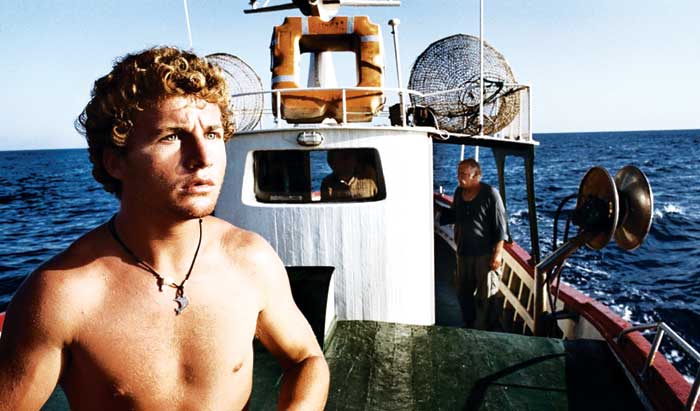Each month, the Indie Prof reviews a current film in the theater and a second film that is available on DVD or an instant-streaming service. Follow “Indie Prof” on Facebook for updates about film events and more reviews.
Terraferma

Scene from Terraferma
A fishing boat finds a bulging refugee raft at sea. The fishermen call the Coast Guard, but the refugees start to jump off the raft and swim to the boat before the Guard arrives. Some begin to drown.
The fishermen, an old man and his grandson, save the jumpers and bring them to land. The fishermen live on the small Italian island of Linosa, equidistant from Tunisia and Sicily. The African refugees take their chances at sea, hoping to find the tiny island. The Italian Coast Guard is very strict with the immigrants: the Italian boats must not pick them up or suffer severe consequences. The fishermen follow the rule of the sea, however: never let someone drown. What happens, then, when the fishermen find a refugee boat and pick up some of the drowning souls?
Terraferma, directed by Emanuele Crialese (Respiro, The Golden Door), was released in Italy in 2011 and has only now made it to American screens. It tells the story of the fishermen, their family, and their struggles with the dying fishing business. The family and the islanders also face a burgeoning tourist business and the African refugees who wash up on their shores. The parallels to our own immigration issues are obvious, and seeing the issue through another lens may help to illuminate our own societal insensitivities and borderline indifference.
While the narrative can be a bit disjunctive, the film has a beautiful lyrical quality that matches the natural lyricism of the setting. The cinematography is stunning, capturing both the beauty and the isolation of the island. The acting is sharp, and it recalls the great Italian Neorealist films of the post-WWII era. There is a gritty realism to the characters that immerses you in their world. The humanism amid the moral dilemma is palpable, and the consequences are urgent. The family is not cut from the Hollywood mold: they have real problems and make hard choices. And as the most poignant films often leave us, the choices become our own: what would we do?
Starts at the Chez Artiste on Sept. 6.
You will like this film if you enjoyed Life is Beautiful, A Better Life or Bread and Tulips.
Upstream Color

Scene from Upstream Color
This is the second feature film by writer-producer-director-actor Shane Carruth. His first film, Primer, was a small ($7,000!), indie Sci-film film from 2004. That first effort was a smart, interesting and somewhat opaque film that was both confounding and attractive. Both films were critical successes if not box-office hits. For his latest film, the same description can be used: smart, interesting, opaque, confounding and attractive. But we can also add beautiful, sensual, mesmerizing and mature.
The narrative—if we can call it that—starts with a woman, Kris (Amy Seimitz), who is abducted by a thief and given a psychotropic drug transmitted through a small worm in her bloodstream. The thief mentally manipulates her, steals all her money and leaves her broken, jobless and confused. Later, she connects with another man (Jeff, played by Shane Carruth), who may have shared the same experience. They develop a relationship that leads them to find out more about that experience.
To describe the narrative in this fashion, however, is akin to describing Moby Dick as a story about a man and a whale. The structure is elliptical and somewhat confusing; the images, cinematography, editing and sound all add up to a film that is best felt rather than understood. This is not a film that answers all its questions or ties up everything neatly. Human nature pushes us toward telling stories, listening to stories, and trying to make some sense of them. If we can’t make sense, it may be either frustrating or liberating.
The film is thus best understood allegorically, and there is no one simple answer. The great Italian director Federico Fellini once said that his job was to bring viewers to the train station. Once there, it was up to the viewer to board the train of their choosing. Upstream Color gives us many trains to board. The beauty is not only boarding one of them, but thinking through the abstractions of each journey.
You will like this film if you enjoyed The Tree of Life, Primer, and/or anything by Bresson, Godard or Truffaut.
Available on Netflix Instant Queue, Amazon VOD and DVD. Please see the Indie Prof section of the Sam Gary Library (in the “Staff Recommends Area”) for this film and other films reviewed here.
Vincent Piturro, PhD, teaches Cinema Studies at Metropolitan State University of Denver. He can be reached at vpiturro@msudenver.edu.




0 Comments